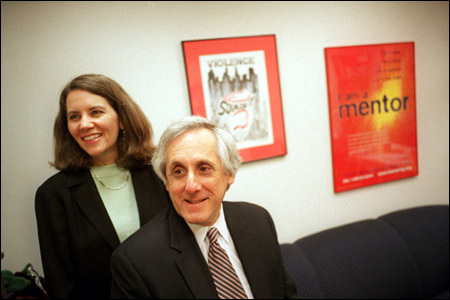HSPH moves to mobilize retiring Boomers
New campaign to model “designated driver” success

The impending retirement of 77 million baby boomers, if managed properly, can transform the nature of American society through an explosion in volunteerism that rejuvenates the societal ties that bind the nation together.
Researchers at the Harvard School of Public Health (HSPH) offered that alternate vision of the future in a report released June 15 by the Center for Health Communication and the MetLife Foundation.
The report concludes that much work needs to be done to make that vision come true, but said that the baby boomers’ retirement need not be viewed solely as the demographic disaster that some have warned.
The dire predictions have been prompted by the size of the baby boom generation, which was born between 1946 and 1964. At 77 million strong and with ever-longer life expectancies, the baby boomers’ retirement is expected to place unprecedented financial strain on public and private retirement systems and on the declining number of taxpayers working to foot the bill.
In their report, “Reinventing Aging: Baby Boomers and Civic Engagement,” Harvard and the MetLife Foundation said that rather than viewing boomers’ retirement solely as a financial strain, society should view it as the freeing of an enormous pool of badly needed human resources from a lifetime of workplace obligations.
“The average boomer who reaches age 65 can expect to live 18 more years, many of those in good health,” said Jay Winsten, associate dean and the Frank Stanton Director of the School of Public Health’s Center for Health Communication. “It’s a new stage of life. … It’s too much time to spend just looking back.”
Winsten and Susan Moses, the center’s deputy director and co-director of the HSPH/MetLife Foundation Initiative, said they’re not just calling for action, they’re getting to work to bring it about.
Building on the nationwide success of the Center for Health Communication’s “designated driver” campaign, Winsten said the new campaign will strive to change societal attitudes about both volunteering and the meaning and purpose of the retirement years.
Media images today often show retired people as idle and disengaged from community life, Moses said. The new campaign’s goal will be to change attitudes by utilizing contacts forged in the designated driver campaign to change the way older characters are portrayed on television and in movies. They also plan to approach the news media and advertising with real world stories that illustrate positive examples.
“The question we want to ask is ‘What do you want to do with the rest of your life?’” Winsten said.
The five-year campaign will target the leading edge of baby boomers, who will turn 60 in two years, in hopes they will become role models in retirement for those coming behind.
Winsten and Moses are confident that many boomers won’t need much prodding. Boomers are more active, healthier, and better educated than generations that came before and so it’s unlikely they’ll suddenly become idle.
“Boomers won’t stand for being put out to pasture,” Winsten said.
But hurdles do remain. Though active, boomers haven’t participated in their communities – from voting to volunteering – nearly as much as the WWII generation that preceded them.
“By every measure of civic engagement, boomers do less,” Moses said.
Part of that is because society doesn’t always hold volunteer activity in high esteem, Moses said. Part of that is also because boomers are currently busy, in many cases both raising children and caring for elderly parents.
But part also is because the nonprofit community isn’t structured well to encourage boomers to volunteer and to take advantage of the opportunity that is looming. Many boomers will be coming to volunteer activities with high skills and may not be interested in the menial jobs many volunteers are asked to perform.
“The infrastructure isn’t ready,” Winsten said. “The organizations that are in the business of making good use of volunteers haven’t planned ahead and are not taking into account the interests and preferences of boomers. Many boomers are self-starters and may not take kindly to an offer of stuffing envelopes.”
There are some signs that this is changing. Winsten said Internet sites already exist that list a wide variety of volunteer jobs and match volunteer skills to needed jobs. Winsten said what’s needed is a structure in each town or region to act as a volunteer coordinating organization, hooking up volunteers with groups that need their skills.
Part of the campaign to motivate boomers will be to emphasize not just the need, but also the benefit to the boomers themselves, Moses said. A variety of studies have shown the physical and psychological benefits of staying connected. Those benefits would help make the retirement years healthy and fulfilling for boomer volunteers.
Moses said it’s also important to dispel the notion that one can’t both volunteer and relax in retirement. In fact, 27 percent of boomers expect to volunteer more when they retire, and also expect to spend more time with their families, more time enjoying their hobbies, and more time traveling.
“It’s not ‘either-or,’ it’s ‘and,’” Moses said.
Moses cautioned against looking at the boomers as a monolithic group. Spanning 18 years and a host of economic, racial, ethnic, and professional backgrounds, boomers are likely to be as eclectic in retirement as they were before retirement.
The push to promote volunteerism is a chance for boomers to reconnect with some of the optimism and idealism that they felt in the 1960s, Moses said. Inspired by John F. Kennedy and the Civil Rights era, many became disillusioned by that decade’s assassinations, the Vietnam War, and Watergate.
“They were idealistic before life got in the way,” Moses said. “Now they have another chance.”




